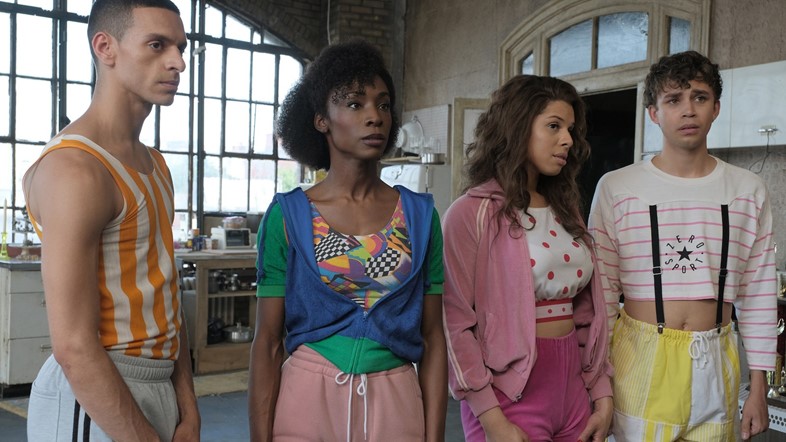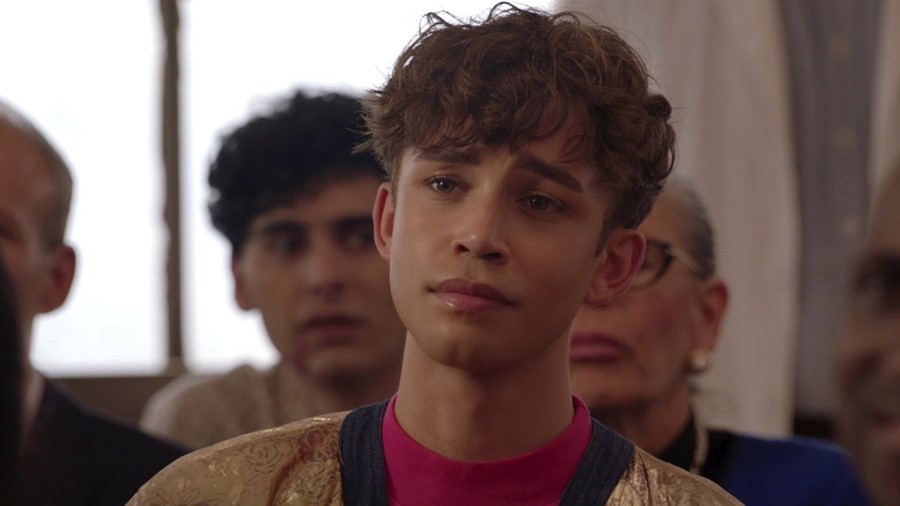Jeremy McClain, who plays Cubby Wintour in Ryan Murphy’s hit drama series, discusses how it feels to be part of the history-making show
*Warning, this article contains spoilers about POSE season three
In a little over three years, Ryan Murphy’s Paris Is Burning-inspired series POSE has changed the landscape of television. Embarking on a six-month search to find and cast real trans women and LGBTQ+ actors of colour, the show was revolutionary before a single episode had even aired. The original script was reportedly rejected by 166 Hollywood studios that didn’t think there would be an audience for it. They couldn’t have been more wrong. POSE became a star-making machine that broke the mould, with myriad awards and many firsts along the way, notably having the largest cast of trans actors ever for a scripted series and, with Janet Mock, the first trans woman of colour to direct an episode of television.
American actor Jeremy McClain got his big break on the show playing Cubby Wintour, a much-trophied ball scene ingenue alongside House siblings Lemar, Lulu and Candy, who he has portrayed since the very first episode. Like many of his peers on POSE, the show was McClain’s television debut, a “special experience surrounded by so many fellow queer actors of colour” that has “no doubt spoilt [him] for all other roles.”
As the third and final season finishes in the US (UK dates yet to be released), McClain, who is now signed with Elite Model Management, discusses how it feels to be part of this history-making love letter to the queer community.
Hynam Kendall: Other than a short film with Halston’s Rebecca Dayan, is it right that this was your first acting job?
JM: Yes! When the role of Cubby came about I was working at Ford Models, doing branding and social media, which is what I went to school for, and in my free time I was in acting classes and writing. Randomly my friend DM’d me and was like, “Hey, I’m not even sure if you’re interested in acting, but I think you’d be great for this new show called POSE – I know the casting director.” It was funny because six months previously when Deadline announced a series by Ryan Murphy set in the 1980s ballroom community I said to my manager “Please try and find anything out about this!” I just knew – I felt – I had to be in this. Like everyone I’d been obsessed with Jennie Livingston’s Paris Is Burning forever. The audition was a five-minute thing, I did some voguing, read my lines – they were actually the lines for Angel, Indya Moore’s character in the show. I left and honestly thought ‘fat chance.’ I got the call a few days later letting me know I got the part of Cubby and I had to be on set five days later. I had to lie to my job and say I was sick when I was really on set with Ryan and Dominique Jackson and the rest of the House of Abundance. My first day was the first scene of the entire show.
“I just knew – I felt – I had to be in this” – Jeremy McClain
HK: POSE upended the idea of what a TV show can look like. Because of this, the impact of POSE is so much bigger than the show itself – a cultural reset that people will refer to for years to come.
JM: I know, right? I’ll be old as shit with all the grandkids around, telling the tale of what it was like to be a part of this show that changed everything! What’s funny is I’m actually still trying to process it. This really did change things, you know? In the moment I wasn’t even thinking about that. It’s easier to comprehend in retrospect. I get these sincere, beautiful messages from people saying how much it means to see people like them on screen and it hits me randomly every day, ‘oh shit, I guess I’m a part of this moment in history that will last forever in the queer cannon.’ There’s a level of authenticity that we don’t usually see [that the show tapped into] by hiring LGBTQ+ writers of colour to make a show about LGBTQ+ people of colour. Because this was my first project, I think I was immensely spoiled by that. I understand now, going for other roles, that unfortunately this is very much not the norm.

HK: The show serves soap and camp, but also covers serious systemic prejudices. The fact that the show did not shy away from politics has been a salve for the community, because these characters in these stories are politicised by merely existing – trans people, queer people of colour. Their life is a political act.
JM: POSE itself is a political act and it’s always been about shining a light on the truth of this community and the realities of this world. It’s not a choice for these characters to pick up and put down the cause whenever they want to. They live it everyday. It’s sink or swim. And that’s the reality to this day. There’s no generational wealth or nepotism or failing upward or any of these things that have helped so many people get to where they are today. There’s adversity to face at every turn and they still manage to rise. So when they get a win, it’s real … and it’s for everyone.
“POSE itself is a political act and it’s always been about shining a light on the truth of this community and the realities of this world” – Jeremy McClain
HK: Were you and the cast aware of just how cathartic and healing it would be simply by showing LGBTQ+ characters coming out on top, to show underrepresented people radically loving and accepting one another?
JM: That was the hope. Representation is more than just having a character there who is from a marginalised background, because we’ve seen a lot of casting in other projects where these actors are just there for trauma porn. In POSE they’re allowed to be fully realised people. Look at Indya Moore’s Angel. You’re allowed to accept this woman as a beautiful, desirable person looking to find love and acceptance within a whole real life. Being allowed the same desire, but also the same human flaws, as everyone else. They’re not just existing in a story for trauma’s sake. All these people had was each other, even if there was competition at the balls for a trophy, at the end of the day, more than winning, you were all together in this.
HK: Cubby’s story started in season one in 1987 as part of the House of Abundance, snatching trophies left and right at the balls. In the final season, time flashes forward to 1994 and your character is tragically dying of Aids-related illness. For this, your portrayal was not prettified or sanitised, it was a real physical transformation and carried great sadness, anger and pain. How important was that decision to portray it this way?
JM: Very important because that was the reality. Other shows have made it easier to look at, but we didn’t want to do a disservice to the people who lived through it. And it’s important to educate the younger generations coming up who haven’t seen this represented so physically. This is the sad truth of their – of our – history, one, two generations removed. I had to get a full body cast made from our FX team, my face was made to look more gaunt, I had false teeth put in to show the degeneration, milky contacts covering my eyes. When I looked in the mirror it was heart-breaking. This was during the peak of Aids when it was the leading cause of death for people 25-44. I think the writers really wanted to show what the realities of some peoples experience with the disease were. The tragedy of wasted youth. People dying before the world got to see them … before they even saw themselves. I did a lot of research, as much as I could find online. It was a hard research process as a queer person, constantly looking at these images and I was distraught after from being reminded what our community has gone through. I also talked to people who were alive during that time who had friends or lovers die from HIV and Aids-related illness.
“A series has been created by us for us and been incredibly successful as a result. There are no more excuses” – Jeremy McClain
In Matthew Lopez’s seminal queer play The Inheritance, there’s a line by a gay man in his fifties that goes, “There are no other gay men my age!” And you realise just how many queer men we lost to the epidemic.
HK: We lost an entire generation of artists, creators, profound intellectuals. We were robbed. Talking to the survivors is the only way to keep it authentic, keep the experience remembered, to do justice to all the people who died from this disease. There’s not that much documentation out there so a lot of keeping the truth alive is just personal stories being passed down. When you’re part of a show that’s covering ground for the first time, encompassing such important issues, you can almost be expected to be an ambassador for it or an authority on the subject. It’s a weight but it’s a good weight. I don’t profess to know everything, but I’m happy to help educate people to be more understanding of the community, our community. It’s a privilege really to be able to do so. Bring it on. I’m happy to speak for those who don’t have this platform and can’t be heard.
HK: Will Hollywood be the same in a post-POSE world?
JM: No. The landscape will never be the same. And it comes down to you can’t say that these stories don’t work and you can’t say that the talent doesn’t exist – both in front of and behind the camera. A series has been created by us for us and been incredibly successful as a result. There are no more excuses. Look at the facts: Billy [Porter] made history as the first openly gay Black man to accept the Emmy for Outstanding Lead Actor in a Drama Series. Angelica Ross has gone from Pose to American Horror Story making her the first transgender actress to secure two series regular roles. These people are working. The conversation has always been ‘it’s about the best actor for the job,’ which is obviously true, but now it’s like, ‘but have you cast a wide enough net to find the best actor?’ Pose has opened Pandora’s box. Try closing it now, Hollywood! People want diversity of experience, diversity of stories … diversity! Audiences want to see the truth of the world around them. There’s no going back at this point – evolve or die!
